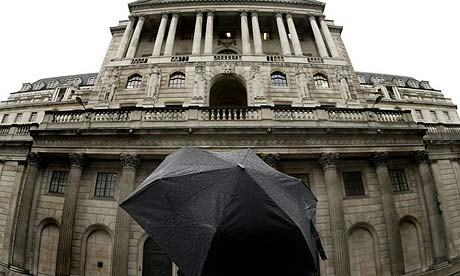Bank of England to pump another £50bn into economy
• Quantitative easing programme expanded to £175bn
• Move bigger than economists had expected
• Datablog: get the numbers behind this story
- guardian.co.uk, Thursday 6 August 2009 14.13 BST
- Article history

The Bank of England said the recession has proved 'deeper than previously thought'. Photograph: Shaun Curry/AFP/Getty images
The Bank of England is pumping another £50bn into the UK economy in a further attempt to lift it out of recession.
Britain's central bank will raise the total amount of new money created under the quantitative easing (QE) programme to £175bn. The move is bigger than economists had expected, with the Bank admitting the recession had been "deeper than previously thought". It also noted that the world economy is still in recession.
City economists broadly welcomed the decision, which sent the FTSE 100 index up to a new high for this year of 4729.58, but pushed sterling down against the dollar.
Stephen Boyle, head of RBS group economics, said: "We won't know for another few quarters if the first £125bn of asset purchases by the Bank of England has managed to stop the rot, but the monetary policy committee has clearly decided that it's better to be safe than sorry and will buy another £50bn of bonds.
"This tells us that the committee believes the UK economy remains in intensive care and that a bigger defibrillator is needed to help it emerge from the worst downturn for a generation."
The Bank also kept interest rates at 0.5%, the lowest on record, as expected.
Alistair Darling, the chancellor, has given his approval for the Bank to extend the QE programme, which was previously capped at £150bn, with £125bn having been used so far.
Treasury minister Stephen Timms said the government and the Bank had been talking about extending the QE programme over the last few weeks. He added that "more encouraging data" in the last few days indicated that QE was starting to help the economy.
In a letter to the chancellor, Bank governor Mervyn King said that the economic outlook meant that an extension to QE was appropriate.
"On the one hand, there is a considerable stimulus still working through from the easing in monetary and fiscal policy and the past depreciation of sterling," he said. "On the other hand, the need for banks to continue repairing their balance sheets is likely to restrict the availability of credit, and past falls in asset prices and high levels of debt may weigh on spending."
In his response, Darling said the extension of the QE scheme would "further assist the flow of credit to businesses".
Philip Shaw, chief economist at Investec, said: "Whilst the MPC has noted some improvement in economic and financial conditions, it stresses the fragility of the current situation, and its decision to expand QE by a further £50bn seems very much driven by its view that inflation will remain very subdued over the medium term."
The City had been divided over whether the Bank would do more today or wait until the asset purchase scheme's impact on the economy became clearer. Today's decision shows that the Bank feels more action is needed to kickstart growth, with economic recovery still fragile.
The central bank embarked on the unprecedented QE programme in March, with £75bn in initial funds, to boost bank lending and spending by buying up financial assets with newly created money.
Today's decision was tricky, as halting the scheme too early risks prolonging the recession, already the worst in decades, while flooding the economy with too much cash could trigger a surge in inflation in coming years.
There are some signs that the British economy is beginning to pull out of the downturn, but economists cautioned these were still tentative.
The pound was trading at around $1.687 against the dollar, having been above $1.70 earlier.

No comments:
Post a Comment